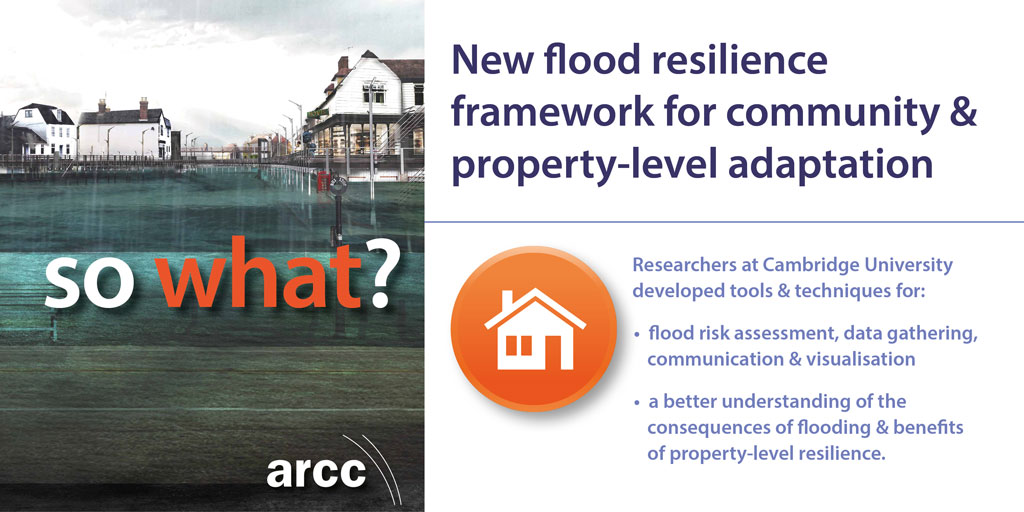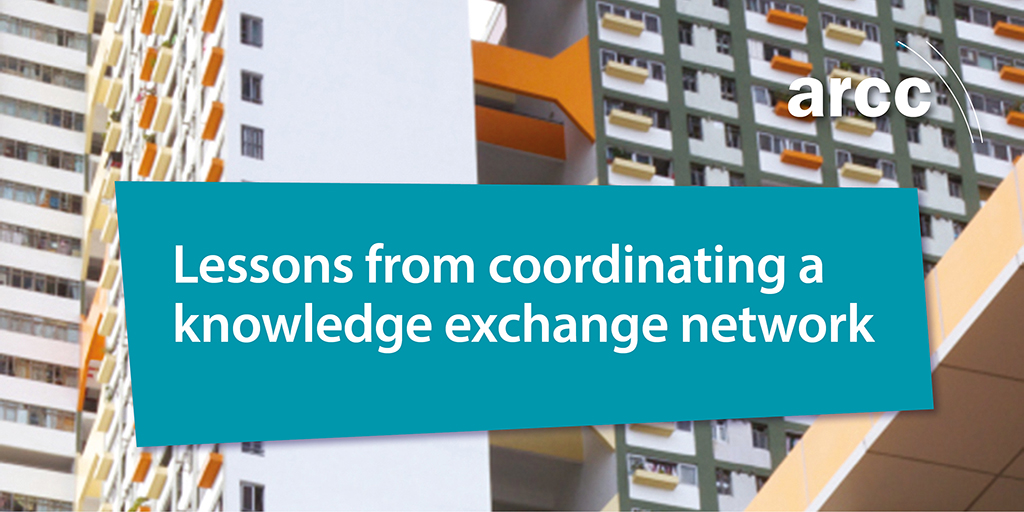Highlights from ARCC – 2016 annual report
With an expanding network of over 1000 key contacts in research, policy and practice, working links with at least 40 multi-disciplinary research teams across the country and a much wider sphere of influence within the UK built environment and infrastructure sectors, the network continues to develop the community and maximise the impact of research.
Many of our activities focused on exploring and delivering new initiatives and approaches in order to expand the knowledge brokerage role. By working with partner organisations and seeking new opportunities, we’ve built links across a broad range of research activities to meet requirements for information from policy and practice.
Meeting evidence requirements
- Science-policy / practice dialogues are longer-term initiatives aimed at stimulating the broader understanding of scientific evidence and its implications for policymakers and practitioners. A major seminar series on Feeling Good in Public Spaces, organised with the Feeling Good Foundation, explored how people’s senses are affected by the design of public spaces and buildings. Six evening events throughout the year focused on the different senses and encouraged reflection on the consequences of design on health and wellbeing as the climate changes:
- Back to basics: human physiology, psychology and place-making with the Welcome Trust
- Smellscapes and soundscapes with Alan Baxter
- Visual spectacle and tactile texture of places with LDA design
- Sensing the place: experiences and wayfinding with BuroHappold Engineering
- Sensing through impairments with IBI Group
- Multi-sensory design – creating healthier public spaces with UAL Central Saint Martins
Over 300 people attended the series, with many more accessing the information online – over 9000 webpage views – bringing research from over 30 research council-funded projects to the attention of a broad range of architects, energy managers, designers and planning professionals. See the full report: Multi-sensory design – creating healthier public spaces (pdf, 11.7 MB).

- Theme-focused initiatives look to stimulate cross-project synergies on specific themes and to strengthen links with a wider range of stakeholders. A new approach explored in 2016 was to take research directly to industry via trade fairs. By coordinating a stand and seminars at UK Construction Week, leading UK researchers were able to showcase their latest building research for new and retrofit construction to a potential audience of 20,000 professionals. Focusing on future materials, building performance tools and approaches to building design , outputs from 10 EPSRC-funded research projects and facilities were delivered directly to those responsible for delivering a well-adapted and resilient built environment.
- Driven by policy and practice needs, the network brought together experts to highlight practical advice for practitioners to deal with pollution and poor air quality. The speakers encouraged inter-disciplinary discussions during the Breathe easy – engineering air quality solutions.
- Green Sky Thinking is a week-long programme for built environment and property professionals, organised by Open-City. In 2016 we became a partner, providing academic advice on the programme themes. We led four events in partnership with BuroHappold and CIBSE Intelligent Buildings group which were attended by over 170 practitioners. Together with CIBSE, we launched the first UK green infrastructure (GI) as a building service design challenge and hosted a series of expert speed talks to explore how GI can integrate as a building management service.
- Promoting co-production of outputs is achieved through joint working opportunities between researchers and those looking to use academic outputs. This scheme was completed in 2016 with 6 projects funded to a total of £50k, to enable six researchers / teams to work with central and local policymakers, with software developers and with adaptation boundary organisations to further the impact of their EPSRC-funded research:
- Urban heat vulnerability mapping with UCL and Hounslow London Borough Council
- Peer-to-peer learning for local authorities on climate resilience for older people, building on BIOPICCC and with Catherine Max
- Developing an integrated flood modelling approach for local flood risk assessment, building on Blue-Green cities with BMT WBM
- Building flood resilience for SMEs, building on CREW with the Environment Agency
- The challenges of financing public sector adaptation projects, building on iBUILD, and working with ClimateXchange & Adaptation Scotland
- Strengthening the resilience of UK transport systems, building on iBUILD working with Department for Transport.
For both researchers and practitioners, these placements have been valuable in building capacity to deliver and use evidence, in increasing impact and awareness, and in helping to develop the skills needed to contribute to future stakeholder-led research projects.
- Increasing the application of research. We secured an EPSRC Impact Acceleration Award from the University of Oxford to fund a research secondment to work on Improving climate resilience in the urban environment: enhancing the uptake and use of building-scale to city-scale decision support models by policymakers and industry (£20k, Jan 2016–Mar 2017). By harnessing the complementary skills of the research expert and the ARCC network, plus access to specific stakeholder networks through organisations such as the London Climate Change Partnership, this work enhances the value and practical use of existing models developed through EPSRC-funded research.
Strengthening knowledge exchange
- A central knowledge exchange website provides up-to-date information on evidence from research, knowledge exchange events and funding opportunities. This is complemented by a monthly e-newsletter that goes out to 880 recipients consisting of 60% researchers and 40% users, and a popular Twitter feed with 830 followers. In addition, we have expanded both the So what, now what? guides and the blog series to help promote the implications of new research findings, and for adaptation experts to share their thoughts. We added five new guides and 10 blog articles in 2016, on subjects ranging from The resilience of the electricity system in the UK through to Challenges and knowledge gaps for the urban research community – a total of 1200 page views. This integrated approach to dissemination and continuous analysis of ongoing engagement continues to build the network.

- Mapping further evidence needs and capacity building requirements. A major task during 2016 was identifying critical areas of research required in the built environment sector, to inform the wider strategic research agenda. Together with EPSRC, the network facilitated a workshop for 60 academics and invited stakeholders to identify short- and long-term research needs and capabilities – see the report: The future of built environment research in the light of societal challenges (pdf, 1.5 MB). This work with the research community continues as themes from the workshop are further developed and explored through an online Provocation Series.
Expert input was also provided to research council events aimed at identifying research to meet user needs, including the EPSRC Air Quality and Climate Change workshop, the EPSRC Living with Environmental Change showcase (LWEC), the NERC Environmental Risks to Infrastructure Innovation Programme, and the LWEC Early career researcher fellowship scheme.
- Capturing the value of a knowledge exchange network. EPSRC challenged us to capture an understanding of what makes an effective network, and to share this learning with other coordinated programmes and funding agencies. Working with Eclipse Research Consultants, findings from workshops and interviews highlighted the complex range of network members’ needs and requirements, and identified the skills, strategies and approaches that the ARCC network team have adopted to manage this complexity. The lessons learnt have been published, and the benefits of an effective knowledge exchange network are emphasised in a recent blog by Ian Cooper of Eclipse Research Consultants. Subsequent presentations at the Low-carbon cities, lowcarbon buildings, SBE16 Chongqing conference in November 2016 generated international interest.

Developing the community
- Skills development for early career researchers (ECRs). Two workshops for ECRs were offered as part of the successful ARCC series of events to help develop the research leaders of the future. These focused on Achieving impact through stakeholder-led proposals and Effective stakeholder engagement. 40 participants from 16 different research institutions benefitted from facilitated cross-sectoral discussions and input from EPSRC, along with guidance from invited stakeholders on developing professional skills and maximising impact from their research.
- Engagement to broaden understanding and engagement. An ongoing task for the network is the identification of strategic opportunities for broadening engagement, raising awareness, sharing knowledge and identifying areas for future collaborative activities. Work has continued with professional bodies and agencies as an efficient means of engaging with a wider audience, including joint activities with the CIBSE Resilient Cities Special Interest Group, the Institution of Engineering and Technology and the Environment Agency’s Infrastructure Operators Adaptation Forum.
International audiences of adaptation experts were engaged through contributions to the National Climate Change Adaptation Research Facility (NCCARF) conference in Australia, the Adaptation Futures 2016 in Europe and the Sustainable Built Environment conference on Low-carbon Cities in China. The network is also linked with a number of EU Horizon2020 projects, for example RESIN and EU-CIRCLE, both looking a resilient infrastructure.
- And finally, another new venture looked to inform the very broadest national audience. As part of UKCIP, the ARCC network worked with the All-Party Parliamentary Climate Change Group and Mediaplanet to coordinate a specialist supplement distributed in The Guardian on Climate Change: what’s next? Looking at climate change risks and how to tackle the adaptation challenge, expert insights included views on infrastructure, energy and emissions reduction and business-related issues.
The ARCC team is:
- Roger Street, Principal Investigator
- Vicky Hayman, Knowledge exchange & coordination officer
- Phil Sivell, Adaptation science officer, infrastructure
- Briony Turner, Knowledge exchange manager
- Tanya Wilkins, Science communicator
- Stephanie Ferguson, Designer & editor

